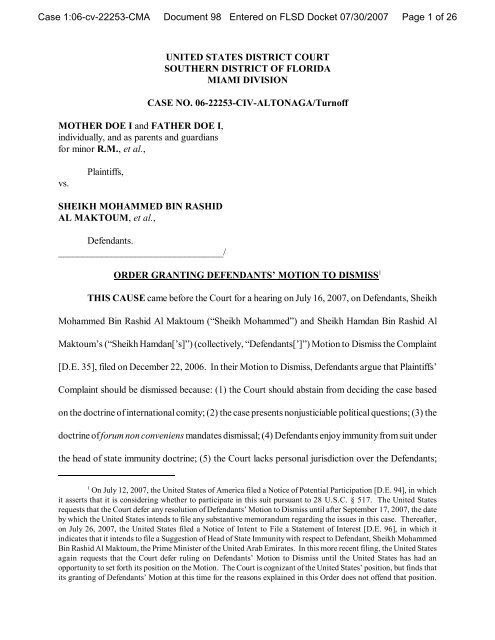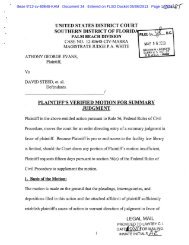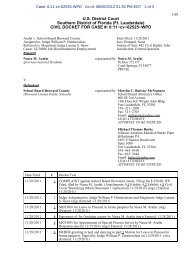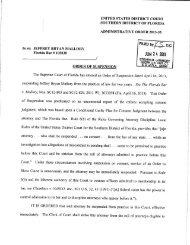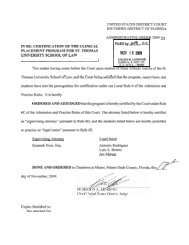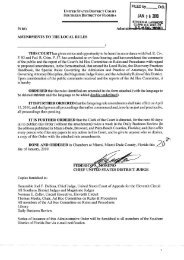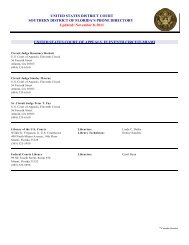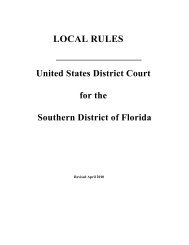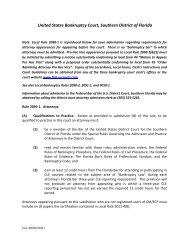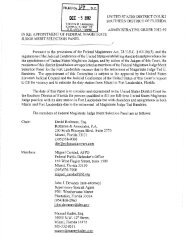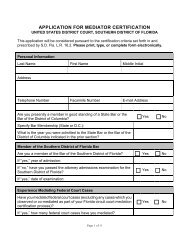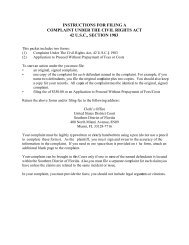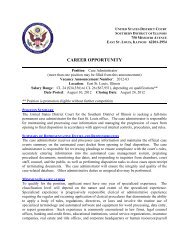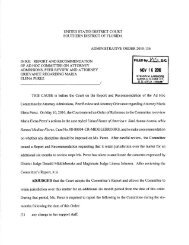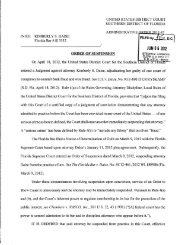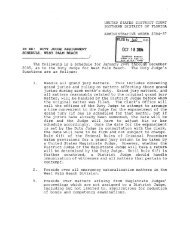ORDER granting Defendants' Motion to Dismiss; Plaintiffs'
ORDER granting Defendants' Motion to Dismiss; Plaintiffs'
ORDER granting Defendants' Motion to Dismiss; Plaintiffs'
You also want an ePaper? Increase the reach of your titles
YUMPU automatically turns print PDFs into web optimized ePapers that Google loves.
Case 1:06-cv-22253-CMA Document 98 Entered on FLSD Docket 07/30/2007 Page 1 of 26<br />
MOTHER DOE I and FATHER DOE I,<br />
individually, and as parents and guardians<br />
for minor R.M., et al.,<br />
vs.<br />
Plaintiffs,<br />
SHEIKH MOHAMMED BIN RASHID<br />
AL MAKTOUM, et al.,<br />
Defendants.<br />
__________________________________/<br />
UNITED STATES DISTRICT COURT<br />
SOUTHERN DISTRICT OF FLORIDA<br />
MIAMI DIVISION<br />
CASE NO. 06-22253-CIV-ALTONAGA/Turnoff<br />
<strong>ORDER</strong> GRANTING DEFENDANTS’ MOTION TO DISMISS 1<br />
THIS CAUSE came before the Court for a hearing on July 16, 2007, on Defendants, Sheikh<br />
Mohammed Bin Rashid Al Mak<strong>to</strong>um (“Sheikh Mohammed”) and Sheikh Hamdan Bin Rashid Al<br />
Mak<strong>to</strong>um’s (“Sheikh Hamdan[’s]”) (collectively, “Defendants[’]”) <strong>Motion</strong> <strong>to</strong> <strong>Dismiss</strong> the Complaint<br />
[D.E. 35], filed on December 22, 2006. In their <strong>Motion</strong> <strong>to</strong> <strong>Dismiss</strong>, Defendants argue that Plaintiffs’<br />
Complaint should be dismissed because: (1) the Court should abstain from deciding the case based<br />
on the doctrine of international comity; (2) the case presents nonjusticiable political questions; (3) the<br />
doctrine of forum non conveniens mandates dismissal; (4) Defendants enjoy immunity from suit under<br />
the head of state immunity doctrine; (5) the Court lacks personal jurisdiction over the Defendants;<br />
1 On July 12, 2007, the United States of America filed a Notice of Potential Participation [D.E. 94], in which<br />
it asserts that it is considering whether <strong>to</strong> participate in this suit pursuant <strong>to</strong> 28 U.S.C. § 517. The United States<br />
requests that the Court defer any resolution of Defendants’ <strong>Motion</strong> <strong>to</strong> <strong>Dismiss</strong> until after September 17, 2007, the date<br />
by which the United States intends <strong>to</strong> file any substantive memorandum regarding the issues in this case. Thereafter,<br />
on July 26, 2007, the United States filed a Notice of Intent <strong>to</strong> File a Statement of Interest [D.E. 96], in which it<br />
indicates that it intends <strong>to</strong> file a Suggestion of Head of State Immunity with respect <strong>to</strong> Defendant, Sheikh Mohammed<br />
Bin Rashid Al Mak<strong>to</strong>um, the Prime Minister of the United Arab Emirates. In this more recent filing, the United States<br />
again requests that the Court defer ruling on Defendants’ <strong>Motion</strong> <strong>to</strong> <strong>Dismiss</strong> until the United States has had an<br />
opportunity <strong>to</strong> set forth its position on the <strong>Motion</strong>. The Court is cognizant of the United States’ position, but finds that<br />
its <strong>granting</strong> of Defendants’ <strong>Motion</strong> at this time for the reasons explained in this Order does not offend that position.
Case 1:06-cv-22253-CMA Document 98 Entered on FLSD Docket 07/30/2007 Page 2 of 26<br />
2 Plaintiffs also assert claims against a number of unnamed defendants.<br />
2<br />
Case No. 06-22253-CIV-ALTONAGA/Turnoff<br />
and (6) Plaintiffs have improperly proceeded on an anonymous basis. In addition <strong>to</strong> these arguments,<br />
Sheikh Mohammed asserts that he enjoys diplomatic immunity from suit and Sheikh Hamdan asserts<br />
that he was improperly served with the Complaint and summons. The Court has carefully considered<br />
the parties’ arguments and written submissions, the amicus curiae brief of the Washing<strong>to</strong>n Legal<br />
Foundation (“WLF”) [D.E. 56-3], and applicable law.<br />
I. BACKGROUND<br />
In September of 2006, Plaintiffs filed their Complaint [D.E. 1] alleging that Sheikh<br />
Mohammed, the Vice President and Prime Minister of the United Arab Emirates (“UAE”), and<br />
Sheikh Hamdan, the Finance Minister of the UAE, participated, in their personal capacities, in the<br />
kidnaping, trafficking, and enslavement of young boys from South Asia and Africa, some as young<br />
as two years old, who were transported <strong>to</strong> the UAE and other Persian Gulf countries <strong>to</strong> serve as<br />
2<br />
jockeys in camel races. Plaintiffs, former child jockeys, both identified and unidentified, and their<br />
parents, both in their individual capacities and as personal representatives of the children, allege that<br />
during the course of their enslavement as jockeys, the children were at times, inter alia, starved,<br />
deprived of sleep, injected with hormones <strong>to</strong> keep them from growing, and sexually abused. (See<br />
Compl. [D.E. 1] at 72, 81).<br />
Plaintiffs bring their lawsuit pursuant <strong>to</strong> the Alien Tort Statute, 28 U.S.C. § 1350, which<br />
provides that “[t]he district courts shall have original jurisdiction of any civil action by an alien for<br />
a <strong>to</strong>rt only, committed in violation of the law of nations or a treaty of the United States.” Specifically,<br />
Plaintiffs assert that Defendants engaged in, conspired <strong>to</strong> engage in, and/or aided and abetted: (1)
Case 1:06-cv-22253-CMA Document 98 Entered on FLSD Docket 07/30/2007 Page 3 of 26<br />
3<br />
Case No. 06-22253-CIV-ALTONAGA/Turnoff<br />
slavery or the slave trade in violation of the law of nations; and (2) forced child labor in violation of<br />
the law of nations. Plaintiffs also assert battery, assault, intentional and/or negligent infliction of<br />
emotional distress, wrongful death, and survival claims against Defendants, seeking compensa<strong>to</strong>ry<br />
and punitive damages in an amount <strong>to</strong> be determined.<br />
The case raises a number of relatively novel issues of jurisdiction and international law, which<br />
the parties have extensively and competently briefed. Because the Court concludes that it lacks<br />
personal jurisdiction over the identified Defendants, it does not reach or address the merits of the<br />
other arguments raised.<br />
II. ANALYSIS<br />
The Eleventh Circuit has held that in deciding Rule 12(b) motions <strong>to</strong> dismiss, district courts<br />
should, as an initial matter, address any personal jurisdiction arguments raised by defendants. See<br />
Madara v. Hall, 916 F.2d 1510, 1513-14 (11th Cir. 1990). Accordingly, the undersigned first<br />
addresses Defendants’ argument that the Court lacks personal jurisdiction over them. Defendants<br />
assert that the Court lacks personal jurisdiction under the Florida long-arm statute and the Due<br />
Process Clause of the Fourteenth Amendment <strong>to</strong> the United States Constitution (the “Due Process<br />
Clause”) because Defendants have had insufficient (or non-existent) contacts with the State of<br />
Florida. They assert, therefore, that the undersigned should dismiss the case in its entirety.<br />
In response, Plaintiffs assert that the Court may exercise personal jurisdiction over Defendants<br />
based on what Plaintiffs maintain are Defendants’ extensive contacts with the State of Florida. In the<br />
alternative, Plaintiffs assert that, should the Court find that Defendants’ contacts do not satisfy the<br />
Florida long-arm statute, the Court may exercise personal jurisdiction pursuant <strong>to</strong> Federal Rule of<br />
Civil Procedure 4(k)(2). The undersigned addresses these potential bases for jurisdiction in turn.
Case 1:06-cv-22253-CMA Document 98 Entered on FLSD Docket 07/30/2007 Page 4 of 26<br />
Case No. 06-22253-CIV-ALTONAGA/Turnoff<br />
A. Exercise of Personal Jurisdiction Under the Florida Long-Arm Statute<br />
1. Legal Standard<br />
Generally, a federal court may properly exercise personal jurisdiction over a non-resident<br />
defendant only if two requirements are satisfied: (1) the state long-arm statute, and (2) the Due<br />
Process Clause. See Posner v. Essex Ins. Co., Ltd., 178 F.3d 1209, 1214 (11th Cir. 1999);<br />
3<br />
Sculptchair, Inc. v. Century Arts, Ltd., 94 F.3d 623, 626 (11th Cir. 1996). Thus, if the applicable<br />
state statute governing personal jurisdiction is satisfied, the Court must then determine whether<br />
sufficient “minimum contacts” exist <strong>to</strong> satisfy the due process requirements of the Fourteenth<br />
Amendment, which include “traditional notions of fair play and substantial justice.” Future Tech.<br />
Today, Inc. v. OSF Healthcare Sys., 218 F.3d 1247, 1249 (11th Cir. 2000) (per curiam); see also<br />
Int’l Shoe Co. v. Washing<strong>to</strong>n, 326 U.S. 310, 316 (1945).<br />
In this case, the personal jurisdiction analysis is governed by Florida law. See Sculptchair,<br />
94 F.3d at 631. Under Florida law, “[a] plaintiff seeking <strong>to</strong> obtain jurisdiction over a nonresident<br />
defendant initially need only allege jurisdiction.” Posner, 178 F.3d at 1214 (citing Electro Eng’g<br />
Prods. Co. v. Lewis, 352 So. 2d 862, 864 (Fla. 1977)). “Plaintiff’s burden in alleging personal<br />
jurisdiction is <strong>to</strong> plead sufficient material facts <strong>to</strong> establish the basis for exercise of such jurisdiction.”<br />
Future Tech., 218 F.3d at 1249; see also Venetian Salami Co. v. Parthenais, 554 So. 2d 499, 502<br />
(Fla. 1989). If a plaintiff pleads sufficient material facts <strong>to</strong> support the exercise of personal<br />
jurisdiction, the burden shifts <strong>to</strong> the defendant <strong>to</strong> challenge the plaintiff’s allegations by affidavits or<br />
other competent evidence. Future Tech., 218 F.3d at 1249. If the non-resident defendant raises a<br />
3 An exception applies where the requirements of Rule 4(k)(2) are satisfied. That provision is addressed<br />
separately in this Order.<br />
4
Case 1:06-cv-22253-CMA Document 98 Entered on FLSD Docket 07/30/2007 Page 5 of 26<br />
4<br />
Case No. 06-22253-CIV-ALTONAGA/Turnoff<br />
meri<strong>to</strong>rious defense <strong>to</strong> the court’s exercise of personal jurisdiction, the burden shifts back <strong>to</strong> the<br />
plaintiff <strong>to</strong> establish through competent evidence that the court’s exercise of jurisdiction is<br />
appropriate. See Musiker v. Projectavision, Inc., 960 F. Supp. 292, 294-95 (S.D. Fla. 1997); Kim<br />
v. Keenan, 71 F. Supp. 2d 1228, 1231 (M.D. Fla. 1999) (“If defendants sufficiently challenge<br />
plaintiff’s assertions, then plaintiff must affirmatively support his or her jurisdictional allegations, and<br />
may not merely rely upon the factual allegations set forth in the complaint.”).<br />
The Florida long-arm statute provides for the exercise of personal jurisdiction over non-<br />
resident persons who are “engaged in substantial and not isolated activity within this state, . . .<br />
whether or not the [plaintiff’s] claim arises from that activity.” Fla. Stat. § 48.193(2). In order <strong>to</strong><br />
exercise personal jurisdiction under this provision, the Court must find that Defendants “maintained<br />
‘continuous and systematic . . . contacts’ with the forum, so that [they] can properly be considered<br />
‘present’ in the forum.” Am. Overseas Marine Corp. v. Patterson, 632 So. 2d 1124, 1127-28 (Fla.<br />
1st DCA 1994) (quoting Helicopteros Nacionales de Colombia, S.A. v. Hall, 466 U.S. 408, 411-12<br />
(1984)).<br />
2. Parties’ Respective Positions<br />
a. Plaintiffs’ Allegations and Evidence Regarding Defendants’<br />
Contacts in Florida 4<br />
In their Complaint, Plaintiffs allege that the Court has personal jurisdiction over Defendants<br />
pursuant <strong>to</strong> Fla. Stat. § 48.193(2), and that Defendants “have purposefully directed their activities<br />
within the United States making them subject <strong>to</strong> the jurisdiction of the Courts and the laws of the<br />
In the interest of efficiency, the undersigned summarizes in this subsection both the jurisdictional<br />
allegations contained in Plaintiffs’ Complaint and the evidence regarding Defendants’ alleged contacts with<br />
Florida that Plaintiffs have submitted in support of their opposition <strong>to</strong> Defendants’ <strong>Motion</strong>.<br />
5
Case 1:06-cv-22253-CMA Document 98 Entered on FLSD Docket 07/30/2007 Page 6 of 26<br />
6<br />
Case No. 06-22253-CIV-ALTONAGA/Turnoff<br />
United States.” (See Compl. at 1-2). Plaintiffs allege that those activities include, but are not<br />
limited <strong>to</strong> Defendants:<br />
(Id. at 3).<br />
a. Personally operating, both as alter egos and as agents of, businesses with<br />
billions of dollars of U.S. assets and millions of dollars in Florida assets;<br />
b. Personally owning and operating, both as alter egos and as agents of, several<br />
U.S. corporations, including ones registered <strong>to</strong> do business in Florida;<br />
c. Personally effectuating large purchases and sales of billions of dollars of U.S.<br />
assets, including millions of dollars of assets in Florida;<br />
d. Personally visiting the United States, including Florida, in a non-official<br />
capacity both for pleasure and in operating their extensive businesses here;<br />
e. Owning multiple residences and hundreds of millions of dollars in investment<br />
real estate in the United States, including in Florida; and<br />
f. Employing hundreds of people in the United States, and personally managing<br />
and directing those employees, including agents and employees in Florida.<br />
Plaintiffs further allege that Defendants’ contacts with the State of Florida include: (1) owning<br />
“businesses and residences throughout the United States,” (id. at 24-25); (2) “maintain[ing]<br />
hundreds of horses at farms in Ocala, Florida,” (id. at 27); and (3) “regularly purchas[ing] or<br />
bid[ding] on horses in Florida personally and through agents,” including “attend[ing] and regularly<br />
purchas[ing] horses at the Ocala Breeders’ Sales Company’s Thoroughbred sales in Ocala, Florida,”<br />
which purchases include Sheikh Mohammed’s February 28, 2006 bid of $15.5 million for a colt at<br />
an auction at Calder Racetrack in Miami, Florida, (id. at 30).<br />
In addition, Plaintiffs allege that certain corporate contacts with the State of Florida should<br />
be attributed <strong>to</strong> Defendants. First, Plaintiffs allege that Godolphin Racing, Inc. (“Godolphin<br />
Racing”), the U.S. subsidiary of a Dubai-based company named Godolphin Racing, is the “alter ego”
Case 1:06-cv-22253-CMA Document 98 Entered on FLSD Docket 07/30/2007 Page 7 of 26<br />
7<br />
Case No. 06-22253-CIV-ALTONAGA/Turnoff<br />
of Defendants and that Defendants “perform actions on behalf of Godolphin Racing and its various<br />
entities in the United States.” (Id. at 31). In a declaration from their counsel, John M. Eubanks,<br />
Esq. (“Eubanks”), submitted in aid of their Response <strong>to</strong> Defendants’ <strong>Motion</strong>, Plaintiffs additionally<br />
assert that Godolphin Racing has been qualified <strong>to</strong> do business in Florida since 1994, as evidenced<br />
by pho<strong>to</strong>copies of the annual reports it filed with the Florida Secretary of State for the years 1996<br />
through 2005. (See Eubanks Decl. [D.E. 50] at 6 and Ex. E).<br />
Second, Plaintiffs allege that Darley Farms of Kentucky (“Darley Farms”) is a corporation that<br />
is wholly-owned by Sheikh Mohammed and acts as his alter ego. (See Compl. at 32). Darley Farms<br />
owns the 2006 Preakness Stakes winner, Bernardini, a horse that was stabled in Florida in the winter<br />
leading up <strong>to</strong> the 2006 racing season. (See id. at 27, 32). In addition, Eubanks asserts that an<br />
entity named Darley Stud Management, Inc. was qualified <strong>to</strong> do business in Florida from 1996<br />
through 2001, and an entity named Darley Stud Management LLC has been qualified <strong>to</strong> do business<br />
in Florida from 2002 through 2006, as evidenced by copies of annual reports filed by those entities<br />
with the Florida Secretary of State. (See Eubanks Decl. at 8 & Ex. G).<br />
Third, Plaintiffs allege that Sheikh Hamdan performs actions on behalf of Shadwell Farms,<br />
LLC (“Shadwell Farms”), a limited liability corporation incorporated in Kentucky in 1998. (See<br />
Compl. at 35). Shadwell Farms owns property in Kentucky and, Plaintiffs allege, was certified in<br />
1996 <strong>to</strong> do business in Florida. (See id. at 35-36). Eubanks asserts in his declaration that an entity<br />
named Shadwell Farm, Inc. was qualified <strong>to</strong> do business in Florida from 1996 through 2003, and an<br />
entity named Shadwell Farm, LLC was qualified <strong>to</strong> do business in Florida from 2004 through 2005,<br />
as evidenced by copies of annual reports those entities filed with the Florida Secretary of State. (See<br />
Eubanks Decl. at 16 & Ex. O).
Case 1:06-cv-22253-CMA Document 98 Entered on FLSD Docket 07/30/2007 Page 8 of 26<br />
8<br />
Case No. 06-22253-CIV-ALTONAGA/Turnoff<br />
Fourth, Plaintiffs allege that Defendants are beneficial owners of the Dubai Holdings Company<br />
and its subsidiaries, one of which, Dubai Investment Group (“DIG”), through another subsidiary,<br />
Longwing Real Estate Ventures, owns the Adam’s Mark Hotel in Jacksonville, Florida, among other<br />
properties throughout the United States. (See Compl. at 38).<br />
Finally, Plaintiffs allege that Dubai Ports World is Defendants’ wholly-owned alter ego<br />
corporation, which Defendants both operate and act as agents for. (See id. at 41). Plaintiffs allege<br />
that Dubai Ports World, which is “owned and directed entirely by either [Sheikh Mohammed] or the<br />
Mak<strong>to</strong>ums collectively[,]” entered in<strong>to</strong> a 2006 agreement <strong>to</strong> purchase a number of United States port<br />
operations, including the Port of Miami. (Id.).<br />
b. Defendants’ Factual Assertions<br />
Defendants assert that Plaintiffs have failed <strong>to</strong> show that Defendants have any personal<br />
contacts with the State of Florida. In support of this argument, Defendants offer two sworn<br />
declarations, one of which addresses Plaintiffs’ allegations regarding Sheikh Mohammed and one of<br />
which addresses the allegations regarding Sheikh Hamdan.<br />
In the first declaration, Mohammed Al Shaibani (“Al Shaibani”), who is President of The<br />
Dubai Office, which manages the personal financial affairs of the Al Mak<strong>to</strong>um family, and who<br />
manages the personal investments of Sheikh Mohammed, asserts that the jurisdictional allegations<br />
contained in Plaintiffs’ Complaint with respect <strong>to</strong> Sheikh Mohammed are incorrect. (See Al Shaibani<br />
Decl. [D.E. 41-2] at 1, 4). Specifically, Al Shaibani asserts that Sheikh Mohammed: (1) neither<br />
owns nor leases any real or personal property located in Florida in his individual capacity, including<br />
any horses, all of which were purchased by or are owned by corporate entities, (see id. at 5a, 6);<br />
(2) does not have any personal or investment accounts of any type in Florida, (see id. at 5b); (3)
Case 1:06-cv-22253-CMA Document 98 Entered on FLSD Docket 07/30/2007 Page 9 of 26<br />
9<br />
Case No. 06-22253-CIV-ALTONAGA/Turnoff<br />
does not conduct business in Florida in his individual capacity, (see id. at 5c); (4) has not bought<br />
or sold any assets in Florida in his individual capacity, (see id. at 5d); (5) does not employ anyone<br />
in Florida, (see id. at 5e); (6) does not file tax returns in Florida, (see id. at 5f); and (6) is not a<br />
direct shareholder or owner of any business or corporation that is registered in, markets <strong>to</strong>, or<br />
conducts business transactions in Florida, (see id. at 5g).<br />
With respect <strong>to</strong> Plaintiffs’ allegations regarding Godolphin Racing, Al Shaibani asserts that<br />
the corporation is an independent corporation incorporated in Delaware with its principal place of<br />
business in Kentucky, and while it is held beneficially for Sheikh Mohammed, it has its own assets,<br />
management, and board of direc<strong>to</strong>rs. (See id. at 7). Al Shaibani asserts that Sheikh Mohammed<br />
has no role in the day-<strong>to</strong>-day management of Godolphin Racing. (See id.). Finally, Al Shaibani<br />
asserts that, while Godolphin Racing does at times stable horses in Florida, it does not own any assets<br />
or properties located in Florida. (See id.).<br />
With respect <strong>to</strong> the Adam’s Mark Hotel in Jacksonville, Florida, Al Shaibani asserts that the<br />
hotel is owned through a joint venture between Longwing Real Estate Ventures, LLC (“Longwing”)<br />
and Oxford Lodging. (See id. at 8). Longwing, a Delaware limited liability company, is wholly<br />
owned by Longwing Real Estate Ventures Inc., which operates out of New York as a subsidiary of<br />
DIG, a Dubai company that invests in real estate in the United States. (See id.). According <strong>to</strong> Al<br />
Shaibani, Sheikh Mohammed has no role in the day-<strong>to</strong>-day management of Longwing, which has its<br />
own assets, management, and board of direc<strong>to</strong>rs. (See id.). Finally, Al Shaibani asserts that<br />
Longwing is simply a passive inves<strong>to</strong>r in the Adam’s Mark Hotel, which is operated by Oxford<br />
Lodging, a company with which Defendants are entirely unrelated. (See id.).<br />
With respect <strong>to</strong> Dubai Ports World, Al Shaibani asserts that the company is owned by Dubai
Case 1:06-cv-22253-CMA Document 98 Entered on FLSD Docket 07/30/2007 Page 10 of 26<br />
10<br />
Case No. 06-22253-CIV-ALTONAGA/Turnoff<br />
Ports Authority, a public corporation in the Emirate of Dubai, UAE, which is, in turn, controlled by<br />
Dubai Ports and Cus<strong>to</strong>ms Free Zone Corporation, another public corporation in the Emirate of Dubai.<br />
(See id. at 9). According <strong>to</strong> Al Shaibani, Sheikh Mohammed has no role in the day-<strong>to</strong>-day<br />
management of Dubai Ports World. (See id.).<br />
In the second declaration submitted by Defendants, Mirza Al Sayegh, who has been an advisor<br />
<strong>to</strong> Sheikh Hamdan for over 20 years and who is President of Shadwell Farms, asserts that the<br />
jurisdictional allegations contained in Plaintiffs’ Complaint with respect <strong>to</strong> Sheikh Hamdan are<br />
incorrect. (See Al Sayegh Decl. [D.E. 42-2] at 1, 4). Specifically, Al Sayegh asserts that Sheikh<br />
Hamdan: (1) neither owns nor leases any real or personal property located in Florida in his individual<br />
capacity, including any horses, all of which were purchased by or are owned by corporate entities,<br />
(see id. at 5a, 6); (2) does not have any personal or investment accounts of any type in Florida,<br />
(see id. at 5b); (3) does not conduct business in Florida in his individual capacity, (see id. at 5c);<br />
(4) has not bought or sold any assets in Florida in his individual capacity, (see id. at 5d); (5) does<br />
not employ anyone in Florida, (see id. at 5e); (6) does not file tax returns in Florida, (see id. at <br />
5f); (6) is not a direct shareholder or owner of any business or corporation that is registered in,<br />
markets <strong>to</strong>, or conducts business transactions in Florida, (see id. at 5g); and (7) has never visited<br />
Florida, (see id. at 5h).<br />
With respect <strong>to</strong> Plaintiffs’ allegations regarding Shadwell Farms, Al Sayegh asserts that the<br />
corporation is an independent corporation held beneficially for Sheikh Hamdan, with its own assets,<br />
management, and board of direc<strong>to</strong>rs. (See id. at 7). Al Sayegh asserts that Sheikh Hamdan has no<br />
role in the day-<strong>to</strong>-day management of Shadwell Farms. (See id.). Finally, Al Sayegh asserts that,
Case 1:06-cv-22253-CMA Document 98 Entered on FLSD Docket 07/30/2007 Page 11 of 26<br />
Case No. 06-22253-CIV-ALTONAGA/Turnoff<br />
while Shadwell Farms does at times send horses <strong>to</strong> Florida for training, it does not own any assets<br />
or properties located in Florida. (See id.).<br />
Al Sayegh asserts that Sheikh Hamdan has no involvement whatsoever with DIG, Longwing,<br />
Godolphin Racing, or Dubai Ports World. (See id. at 8-11).<br />
Defendants contend that these declarations conclusively illustrate that they had no personal<br />
contacts with the State of Florida, that acts of the corporations named in Plaintiffs’ Complaint cannot<br />
be attributed <strong>to</strong> Defendants, and that, even if the corporate acts could be attributed <strong>to</strong> Defendants,<br />
the corporate contacts with the State of Florida would not be extensive enough <strong>to</strong> permit the exercise<br />
of general personal jurisdiction under Fla. Stat. § 48.193(2). Defendants also assert that even if the<br />
long-arm statute is satisfied, the Due Process Clause prohibits the Court’s exercise of personal<br />
jurisdiction over Defendants.<br />
c. Plaintiffs’ Position Regarding Attribution of Corporate Acts <strong>to</strong><br />
Defendants<br />
With respect <strong>to</strong> Sheikh Mohammed, Plaintiffs argue in their Response Brief that Godolphin<br />
5<br />
Racing LLC and Darley Stables LLC are “synonymous with Defendant Sheikh Mohammed.” (See<br />
Resp. Br. [D.E. 48] at 42). In support of this assertion, Plaintiffs rely upon the Eubanks declaration.<br />
With respect <strong>to</strong> Godolphin Racing, Eubanks asserts that the Godolphin Racing website contains<br />
Sheikh Mohammed’s image and a quote that has been attributed <strong>to</strong> him. (See Eubanks Decl. at 3).<br />
Eubanks also asserts that Sheikh Mohammed’s personal website <strong>to</strong>uts Sheikh Mohammed’s love for<br />
horses and his establishment of Godolphin Racing in 1994. (See id. at 4). Eubanks also points <strong>to</strong><br />
5 The entity “Darley Stables LLC” is mentioned neither in Plaintiffs’ Complaint nor in the Eubanks<br />
declaration. Those documents mention only Darley Farms of Kentucky, (see Compl. at 32), and Darley Stud<br />
Management, Inc. and Darley Stud Management LLC, (see Eubanks Decl. at 8). Plaintiffs fail <strong>to</strong> explain how Darley<br />
Stables LLC, if that entity exists, is related <strong>to</strong> the other Darley entities or <strong>to</strong> Sheikh Mohammed.<br />
11
Case 1:06-cv-22253-CMA Document 98 Entered on FLSD Docket 07/30/2007 Page 12 of 26<br />
Case No. 06-22253-CIV-ALTONAGA/Turnoff<br />
an International Herald Tribune article that refers <strong>to</strong> Godolphin Racing as “Sheikh Mohammed[’s]<br />
Godolphin stable.” (Id. at 5).<br />
6<br />
With respect <strong>to</strong> Darley Farms, Eubanks identifies a January 23, 2007 USA Today article that<br />
refers <strong>to</strong> Preakness Stakes winner Bernardini as being “owned by Sheikh Mohammed’s Darley<br />
Stable[,]” (id. at 7), and a November 15, 2006 article published at http://www.ntra.com that refers<br />
<strong>to</strong> a horse being “purchased privately by Sheikh Mohammed’s Darley Stable and transferred <strong>to</strong> trainer<br />
Eoin Harty’s stable at Palm Meadows, Fla.[,]” (id. at 13). Eubanks also asserts that in March 2007,<br />
a John Ferguson (“Ferguson”), the bloods<strong>to</strong>ck manager of Darley Stable, “who has been described<br />
as ‘represent[ing] . . . Sheikh Mohammed al-Mak<strong>to</strong>um of Darley,’ purchased seven horses at Miami’s<br />
Calder Race Course on behalf of Sheikh Mohammed at a cost of $6.42 million.” (Resp. Br. at 43;<br />
Eubanks Decl. at 2, 9). At the same sale held in the year 2005, Eubanks asserts, Ferguson called<br />
Sheikh Mohammed while bidding on horses. (See Eubanks Decl. at 10). Eubanks also identifies<br />
a February 14, 2007 article published at http://www.gainesway.com that states that “Sheikh<br />
Mohammed bin Rashid al Mak<strong>to</strong>um’s Darley Stable bought a Smoke Glacken colt for $550,000 . .<br />
. .” (Id. at 11). Eubanks also attaches <strong>to</strong> his declaration a spreadsheet showing that Darley Stable<br />
and Ferguson purchased 43 horses for a <strong>to</strong>tal price of $37.67 million between 2003 and 2007. (See<br />
id. at 12 & Ex. K). Finally, Eubanks asserts that Ferguson has stated that Sheikh Mohammed “ha[s]<br />
horses at Robert Scanlon’s training center” in Willis<strong>to</strong>n, Florida. (Id. at 10). With respect <strong>to</strong><br />
Sheikh Hamdan, Plaintiffs argue that Shadwell Farms is “synonymous with” Sheikh Hamdan. (Resp.<br />
Br. at 44). In support of this argument, Plaintiffs again point <strong>to</strong> the USA Today article mentioned<br />
6 It is unclear from his declaration whether Eubanks intends <strong>to</strong> refer <strong>to</strong> Darley Farms of Kentucky, Darley Stud<br />
Management, Inc., Darley Stud Management LLC, or some other corporate entity.<br />
12
Case 1:06-cv-22253-CMA Document 98 Entered on FLSD Docket 07/30/2007 Page 13 of 26<br />
Case No. 06-22253-CIV-ALTONAGA/Turnoff<br />
above, which also refers <strong>to</strong> horse Invasor as being “owned by Sheikh Hamdan’s Shadwell Farm.”<br />
(Eubanks Decl. at 7). Plaintiffs also assert that “it has been widely reported that ‘Sheikh Hamdan<br />
. . . competes at Shadwell Stable.’” (Resp. Br. at 45; Eubanks Decl. at 14-15 & Exs. M, N).<br />
Eubanks also cites <strong>to</strong> Sheikh Hamdan’s website, which indicates that “Shadwell’s global success is<br />
largely due <strong>to</strong> Sheikh Hamdan’s great leadership and hands-on management.” (Eubanks Decl. at <br />
15).<br />
Finally, Eubanks identifies three articles that were published on the Shadwell Farms website.<br />
(See id. at 17-19). The first article states that Shadwell Farms horse Jazil, which won the 2006<br />
Belmont Stakes, raced at Gulfstream Park in Florida on February 8, 2007. (See id. at 17). The<br />
second article states that Shadwell Farms horse Invasor, which won the 2006 Breeders’ Cup Classic,<br />
was <strong>to</strong> be housed in Palm Meadows, Florida. (See id. at 18). The third article states that Invasor<br />
raced at Gulfstream Park in Florida in 2007. (See id. at 19).<br />
3. Legal Analysis<br />
The parties appear <strong>to</strong> agree that the Court’s exercise of personal jurisdiction may not be<br />
premised upon Defendants’ in-person contacts with the State of Florida, as Plaintiffs make no specific<br />
allegations regarding Sheikh Mohammed’s travels <strong>to</strong> Florida and do not dispute Defendants’<br />
contention that Sheikh Hamdan has never even visited Florida. Plaintiffs also do not sufficiently<br />
demonstrate that any Defendants made any contacts with the State of Florida in their individual<br />
capacities, instead choosing <strong>to</strong> premise jurisdiction upon Defendants’ involvement with and operation<br />
7<br />
of various corporations. The only issue <strong>to</strong> be resolved, therefore, is whether the activities and<br />
7 Although Plaintiffs allege generally in their Complaint that Defendants, inter alia, “[p]ersonally effect[ed]<br />
large purchases and sales of . . . assets, including millions of dollars of assets in Florida,” and “[p]ersonally own[]<br />
multiple residences . . . in the U.S., including in Florida,” (see Compl. at 3), these bare allegations have been<br />
13
Case 1:06-cv-22253-CMA Document 98 Entered on FLSD Docket 07/30/2007 Page 14 of 26<br />
Case No. 06-22253-CIV-ALTONAGA/Turnoff<br />
contacts of Defendants’ companies, Godolphin Racing, Darley Farms, Shadwell Farms, Longwing,<br />
and/or Dubai Ports World, some of which are registered <strong>to</strong> do business in or own property in Florida,<br />
may be attributed <strong>to</strong> Defendants for purposes of the Court’s jurisdictional analysis.<br />
Florida law is clear that, generally, “the actions of a corporation cannot be imputed <strong>to</strong> its<br />
shareholders for purposes of establishing long arm personal jurisdiction over the shareholder.”<br />
Suroor v. First Inv. Corp., 700 So. 2d 139, 141 (Fla. 5th DCA 1997). In Suroor, the court found<br />
that imputation of corporate acts <strong>to</strong> an individual defendant shareholder was inappropriate despite<br />
the plaintiff’s explicit allegation that the defendant was the “beneficial owner” of the corporation. See<br />
id. This rule arises from the “basic tenet of American corporate law . . . that the corporation and its<br />
shareholders are distinct entities.” Dole Food Co. v. Patrickson, 538 U.S. 468, 474 (2003).<br />
Despite this general rule, “[a] nonresident shareholder of a corporation doing business in<br />
Florida may be subject <strong>to</strong> long-arm jurisdiction under an alter ego theory . . . .” Aldea Commc’ns,<br />
Inc. v. Gardner, 725 So. 2d 456, 457 (Fla. 2d DCA 1999). In order <strong>to</strong> properly allege the “alter ego”<br />
theory, a plaintiff must allege “both that the resident corporation was a mere instrumentality of its<br />
shareholders, and that the corporation was used for improper conduct.” Bellairs v. Mohrmann, 716<br />
So. 2d 320, 323 (Fla. 2d DCA 1998).<br />
Plaintiffs argue that the corporate acts detailed in their Complaint may be attributed <strong>to</strong><br />
Defendants because the corporations are “held beneficially” for Defendants. Despite the apparent<br />
“alter ego” language contained in their Complaint, Plaintiffs explicitly disclaim reliance on an alter<br />
sufficiently overcome by the sworn declarations submitted by Defendants, in which individuals with personal<br />
knowledge assert that these allegations are untrue. Because Plaintiffs have failed <strong>to</strong> submit competent evidence <strong>to</strong><br />
contradict the defense declarations, the undersigned focuses on Plaintiffs’ allegations and arguments regarding<br />
Defendants’ corporate contacts with the State of Florida.<br />
14
Case 1:06-cv-22253-CMA Document 98 Entered on FLSD Docket 07/30/2007 Page 15 of 26<br />
Case No. 06-22253-CIV-ALTONAGA/Turnoff<br />
ego theory and contend that they are not attempting <strong>to</strong> “pierce the corporate veil.” (See Resp. Br.<br />
at 41). Instead, Plaintiffs assert that the fact that the corporations at issue are “held beneficially” for<br />
Defendants is sufficient <strong>to</strong> allow attribution of the corporate acts <strong>to</strong> Defendants as individuals. In<br />
support of this argument, Plaintiffs cite <strong>to</strong> a number of Commodity Futures Trading Commission<br />
cases brought pursuant <strong>to</strong> the Commodity Exchange Act, in which accounts or assets “held for the<br />
benefit of” an enjoined party were considered <strong>to</strong> be the enjoined party’s property. (See id. at 40<br />
(citing, e.g., Commodity Futures Trading Comm’n v. Valko, 2006 WL 2620197, at *2 (S.D. Fla. Jan.<br />
4, 2006))). Plaintiffs also cite <strong>to</strong> Federal Trade Commission cases in which real or personal property<br />
“held for the benefit of” a defendant was held <strong>to</strong> be included in the definition of the word “assets.”<br />
(See id. (citing, e.g., Federal Trade Comm’n v. Bryant, 2004 WL 2504357, at *2 (M.D. Fla. Oct.<br />
4, 2004))). Plaintiffs also point out that pursuant <strong>to</strong> Florida law, funds placed in escrow are “held for<br />
the benefit of third persons[,]” but are considered assets of those persons. (See id.).<br />
(Id. at 41).<br />
The essence of Plaintiffs’ argument is that<br />
corporations “beneficially held” for, and belonging <strong>to</strong>, the Defendants are assets of the<br />
Defendants for purposes of assessing the extent of Defendants’ contacts here. . . .<br />
Defendants have a unity of interest with their “beneficially held” corporate entities that<br />
go directly <strong>to</strong> the substantial and not isolated contacts analysis sufficient <strong>to</strong> satisfy the<br />
Florida long-arm statute. Simply stated, . . . the Defendants do business in the State<br />
of Florida. Therefore, the assets of these corporate entities, including race horses,<br />
constitute assets of the individual Defendants as well.<br />
Plaintiffs’ insistence that acts of corporate entities should be attributed <strong>to</strong> Defendants as<br />
8<br />
individuals, despite their admission that they are not attempting <strong>to</strong> satisfy the “alter ego” theory, is<br />
8 As noted, Plaintiffs have explicitly stated, both in their briefs and at oral argument, that they are not<br />
proceeding under an alter ego theory. The undersigned also observes that the allegations of Plaintiffs’ Complaint are<br />
plainly insufficient <strong>to</strong> satisfy the alter ego test. See Bellairs, 716 So. 2d at 323 (noting that in order <strong>to</strong> satisfy alter ego<br />
15
Case 1:06-cv-22253-CMA Document 98 Entered on FLSD Docket 07/30/2007 Page 16 of 26<br />
Case No. 06-22253-CIV-ALTONAGA/Turnoff<br />
contrary <strong>to</strong> well-settled principles of corporate law, and Plaintiffs have cited no authority <strong>to</strong> support<br />
their position. Under the facts as alleged, and in the absence of an allegation or showing that the<br />
corporate veil should be pierced because Defendants failed <strong>to</strong> properly observe the corporate form,<br />
none of the corporate acts detailed in Plaintiffs’ Complaint or in the Eubanks declaration may be<br />
imputed <strong>to</strong> Defendants as individuals.<br />
While not necessary, the undersigned finds it useful <strong>to</strong> set forth some specific examples of the<br />
insufficiency of Plaintiffs’ allegations. First, Plaintiffs appear <strong>to</strong> argue that because a picture of and<br />
quotation by Sheikh Mohammed is featured on the Godolphin Racing website, that corporation<br />
should be considered an asset of Sheikh Mohammed’s. (See id. at 42). If courts were <strong>to</strong> attribute<br />
corporate acts <strong>to</strong> every individual who is involved in establishing or is intimately involved with a<br />
corporation, or whose picture is featured on a corporation’s website, the corporate form would be<br />
rendered completely meaningless.<br />
Second, Plaintiffs rely upon news articles in which unidentified individuals, who may have no<br />
personal knowledge whatsoever regarding the Defendants or their assets, refer <strong>to</strong> certain corporations<br />
as, for example, “Sheikh Mohammed[’s] . . . stable[,]” (Eubanks Decl. at 5), or “Sheikh Hamdan’s<br />
Shadwell Farm[,]” (id. at 7). These types of statements have no bearing whatsoever upon the<br />
question of whether the acts of corporations may be attributed <strong>to</strong> individuals for purposes of the<br />
Court’s analysis of personal jurisdiction.<br />
The fact that Defendants may have involvement, even extensive involvement, with<br />
corporations that do business in Florida is not sufficient, in and of itself, <strong>to</strong> establish that Defendants<br />
theory, plaintiff must plead “both that the resident corporation was a mere instrumentality of its shareholders, and that<br />
the corporation was used for improper conduct”).<br />
16
Case 1:06-cv-22253-CMA Document 98 Entered on FLSD Docket 07/30/2007 Page 17 of 26<br />
17<br />
Case No. 06-22253-CIV-ALTONAGA/Turnoff<br />
themselves are subject <strong>to</strong> the personal jurisdiction of a Florida court. See Newberry v. Rife, 675 So.<br />
2d 684, 685 (Fla. 2d DCA 1996) (“The mere fact that one holds shares in or is a direc<strong>to</strong>r of a<br />
corporation is not the functional equivalent of doing business in the state.”); Nichols v. Paulucci, 652<br />
So. 2d 389, 392 n.5 (Fla. 5th DCA 1995) (“By itself, ownership of property is insufficient <strong>to</strong> subject<br />
a nonresident defendant <strong>to</strong> the jurisdiction of the courts of this state, unless the cause of action arose<br />
out of such ownership.”). The undersigned therefore concludes that there is no basis upon which <strong>to</strong><br />
exercise general personal jurisdiction over Defendants under Fla. Stat. § 48.193(2).<br />
B. Exercise of Personal Jurisdiction Under Federal Rule of Civil Procedure 4(k)(2)<br />
Having determined that the Florida long-arm statute does not allow the Court <strong>to</strong> exercise<br />
personal jurisdiction over Defendants, the undersigned turns <strong>to</strong> an analysis of whether Federal Rule<br />
of Civil Procedure 4(k)(2), the “federal long-arm statute,” see Saudi v. Northrup Grumman Corp.,<br />
427 F.3d 271, 275 (4th Cir. 2005), provides for the exercise of such jurisdiction. Rule 4(k)(2)<br />
provides:<br />
If the exercise of jurisdiction is consistent with the Constitution and laws of the<br />
United States, serving a summons or filing a waiver of service is also effective, with<br />
respect <strong>to</strong> claims arising under federal law, <strong>to</strong> establish personal jurisdiction over the<br />
person of any defendant who is not subject <strong>to</strong> the jurisdiction of the courts of general<br />
jurisdiction of any state.<br />
Because Plaintiffs base their claims, in part, upon federal law (the Alien Tort Statute), they<br />
may attempt <strong>to</strong> premise jurisdiction upon Rule 4(k)(2). Even assuming that Plaintiffs properly served<br />
both Defendants (which both Defendants challenge), in order <strong>to</strong> establish the propriety of the exercise<br />
of jurisdiction under the Rule, Plaintiffs must establish that Defendants are not subject <strong>to</strong> personal<br />
jurisdiction in any state. Such a conclusion is inconsistent with the allegations of Plaintiffs’<br />
Complaint.
Case 1:06-cv-22253-CMA Document 98 Entered on FLSD Docket 07/30/2007 Page 18 of 26<br />
18<br />
Case No. 06-22253-CIV-ALTONAGA/Turnoff<br />
In their Complaint, Plaintiffs allege that both Defendants: (1) “personally attend auctions and<br />
personally bid on horses in the United States,” particularly at the Keeneland Thoroughbred sales in<br />
Lexing<strong>to</strong>n, Kentucky, (Compl. at 28-29); (2) “annually spend some part of the year in Kentucky<br />
where they have residences, survey their land holdings and conduct extensive business,” (id. at 33);<br />
and (3) when in Kentucky, “often reside at Gainsborough Farm, where a staff of eight attends <strong>to</strong><br />
them,” (id.). These allegations, as distinguished from Plaintiffs’ allegations with respect <strong>to</strong> Florida,<br />
establish that Defendants have had personal contacts with the State of Kentucky. It is unclear from<br />
the facts alleged here whether Defendants have engaged in those contacts solely in their capacity as<br />
agents of the above-mentioned corporations or whether some of the contacts have been made in<br />
Defendants’ individual capacities.<br />
Nevertheless, it appears that such alleged extensive contacts, including residing in Kentucky<br />
for some period of time, may allow a Kentucky court <strong>to</strong> exercise personal jurisdiction over<br />
Defendants. In addition, there is no evidence before the Court regarding Defendants’ contacts with<br />
states other than Florida and Kentucky. The undersigned therefore cannot find, based on the record<br />
before her, that Defendants are “not subject <strong>to</strong> the jurisdiction of the courts of general jurisdiction<br />
of any state,” and consequently the exercise of jurisdiction under Rule 4(k)(2) is not appropriate.<br />
At oral argument, Plaintiffs asserted that should the undersigned find personal jurisdiction<br />
lacking in Florida, she should transfer the case <strong>to</strong> a district court in Kentucky. The issue of the<br />
propriety of a Kentucky court’s exercise of personal jurisdiction over Defendants has not been fully<br />
briefed by the parties and the record on this issue has not been fully developed. The undersigned is<br />
not in a position <strong>to</strong> determine whether a Kentucky court’s exercise of personal jurisdiction in this case
Case 1:06-cv-22253-CMA Document 98 Entered on FLSD Docket 07/30/2007 Page 19 of 26<br />
19<br />
Case No. 06-22253-CIV-ALTONAGA/Turnoff<br />
would be proper, particularly given that Plaintiffs have not alleged any statute of limitations or other<br />
bar <strong>to</strong> refiling this suit in Kentucky. Thus, transfer <strong>to</strong> Kentucky is also not appropriate.<br />
C. Plaintiffs’ Entitlement <strong>to</strong> Jurisdictional Discovery<br />
Plaintiffs filed their Complaint on September 7, 2006. On Oc<strong>to</strong>ber 5, 2006, upon the first<br />
appearance of counsel for the named Defendants, the undersigned entered an Order Requiring<br />
Scheduling Report [D.E. 6] pursuant <strong>to</strong> Local Rule 16.1. That Rule requires that the parties submit<br />
a written report outlining their discovery plan, among other information.<br />
In response, the parties filed an Agreed <strong>Motion</strong> for Enlargement of Time <strong>to</strong> File Joint<br />
Scheduling Report, Certificates of Interested Parties, and Corporate Disclosure Statements, in which<br />
they represented that they had “agreed that it would [be] inefficient <strong>to</strong> prepare and file a joint<br />
scheduling report . . . in advance of the Court’s ruling on the motion <strong>to</strong> dismiss” Defendants were<br />
preparing. (Agreed Mot. [D.E. 8] at 2). The parties further sought leave <strong>to</strong> file the documents<br />
ordered 30 days after any ruling on the as-yet-unfiled motion <strong>to</strong> dismiss, for which the Court had set<br />
an extended briefing schedule per the parties’ agreement [D.E. 5].<br />
The parties’ request for an enlargement of time was denied by Order dated Oc<strong>to</strong>ber 26, 2006<br />
[D.E. 10]. In that Order, the Court explained that “the pendency of a motion <strong>to</strong> dismiss, or the<br />
intention <strong>to</strong> file one, does not stay litigation or the need <strong>to</strong> establish pre-trial and trial dates <strong>to</strong> ensure<br />
the orderly progress of a case.” The parties were again instructed <strong>to</strong> file their joint scheduling report,<br />
and if they wished, <strong>to</strong> indicate their “preference <strong>to</strong> have a period of time for consideration of the<br />
motion <strong>to</strong> dismiss during which no merits discovery or other activity may occur.” (Id.). Thereafter,<br />
and upon receipt of the parties’ proposed scheduling order [D.E. 16], the Court entered an Order
Case 1:06-cv-22253-CMA Document 98 Entered on FLSD Docket 07/30/2007 Page 20 of 26<br />
Setting Trial and Pre-Trial Schedule [D.E. 18]. 9<br />
Case No. 06-22253-CIV-ALTONAGA/Turnoff<br />
As stated, Defendants’ <strong>Motion</strong> <strong>to</strong> <strong>Dismiss</strong> was filed on December 22, 2006. Among the<br />
arguments presented was the argument that “the Court lacks personal jurisdiction over Defendants<br />
because they do not have sufficient contacts in Florida <strong>to</strong> satisfy the requirements of Florida’s long-<br />
arm statute and the constitutional prerequisites of due process.” (Mot. [D.E. 35] at 2). This<br />
argument was addressed in eight pages of text in the Memorandum of Law in Support [D.E. 36], and<br />
in the several declarations filed. The argument was again addressed in approximately 10 pages of text<br />
in Defendants’ Reply Memorandum [D.E. 74]. Defendants’ <strong>Motion</strong> <strong>to</strong> <strong>Dismiss</strong> was not fully briefed<br />
until the filing of Plaintiffs’ Sur-Reply Memorandum [D.E. 89] on July 6, 2007, over six months after<br />
the <strong>Motion</strong> was filed.<br />
Plaintiffs at no time sought leave of court <strong>to</strong> take limited jurisdictional discovery. They did<br />
not do so when apprised of Defendants’ intention <strong>to</strong> seek a dismissal prior <strong>to</strong> the <strong>Motion</strong> being filed,<br />
and they did not do so upon being formally challenged on the basis of lack of personal jurisdiction.<br />
In a footnote of their Memorandum of Law in Opposition <strong>to</strong> the <strong>Motion</strong> <strong>to</strong> <strong>Dismiss</strong>, Plaintiffs state<br />
that if the Court finds they have not sufficiently demonstrated the existence of jurisdiction, “they<br />
should be permitted <strong>to</strong> take jurisdictional discovery. A plaintiff faced with a motion <strong>to</strong> dismiss for<br />
lack of personal jurisdiction is entitled <strong>to</strong> reasonable jurisdictional discovery.” (Resp. Br. at 47 n.10).<br />
Again, in their Corrected Sur-Reply Memorandum, Plaintiffs state they have a qualified right <strong>to</strong><br />
jurisdictional discovery, and if the Court is not inclined <strong>to</strong> exercise jurisdiction based on the facts in<br />
the record, Plaintiffs request the opportunity <strong>to</strong> engage in jurisdictional discovery and thereafter file<br />
9 The Order Setting Trial and Pre-Trial Schedule was abated by order dated May 30, 2007 [D.E. 84], as a<br />
result of “the delays in briefing the issue raised in Defendants’ <strong>Motion</strong> <strong>to</strong> <strong>Dismiss</strong> Complaint.”<br />
20
Case 1:06-cv-22253-CMA Document 98 Entered on FLSD Docket 07/30/2007 Page 21 of 26<br />
21<br />
Case No. 06-22253-CIV-ALTONAGA/Turnoff<br />
a supplemental memorandum. (See Sur-Reply Br. [D.E. 92-2] at 41). Nevertheless, in the over six<br />
months it has taken the parties <strong>to</strong> fully brief the <strong>Motion</strong>, no motion seeking jurisdictional discovery<br />
was filed.<br />
The question thus presented is whether the Court should postpone its decision concerning<br />
personal jurisdiction <strong>to</strong> allow Plaintiffs an opportunity, almost a year after the suit was filed and after<br />
all arguments have been presented in writing and orally, and in the absence of a formal motion or<br />
other showing as <strong>to</strong> the scope of any proposed jurisdictional discovery request and on the factual<br />
showing made by Plaintiffs, <strong>to</strong> engage in such discovery. The answer is “No.”<br />
It is well-accepted that a qualified right <strong>to</strong> jurisdictional discovery exists. See, e.g., Ea<strong>to</strong>n v.<br />
Dorchester Dev., Inc., 692 F.2d 727, 729-31 (11th Cir. 1982). Under Federal Rule of Civil<br />
Procedure 26(b)(1), “[p]arties may obtain discovery regarding any matter, not privileged, which is<br />
relevant <strong>to</strong> the subject matter involved in the pending action, . . . .” Discovery is not limited <strong>to</strong> the<br />
merits of a case, as it is available <strong>to</strong> ascertain the facts bearing on issues such as jurisdiction or venue.<br />
See Oppenheimer Fund, Inc. v. Sanders, 437 U.S. 340, 351 n.13 (1978). Thus, “‘[a] plaintiff faced<br />
with a motion <strong>to</strong> dismiss for lack of personal jurisdiction is entitled <strong>to</strong> reasonable discovery, lest the<br />
defendant defeat the jurisdiction of a federal court by withholding information on its contacts with<br />
the forum.’” Diamond Chem. Co. v. A<strong>to</strong>fina Chems., Inc., 268 F. Supp. 2d 1, 15 (D.C. Cir. 2003)<br />
(quoting El-Fadl v. Cent. Bank of Jordan, 75 F.3d 668, 676 (D.C. Cir. 1996)).<br />
The standards for permitting jurisdictional discovery vary by circuit. For example, the<br />
standard for permitting jurisdictional discovery is “quite liberal” in the D.C. Circuit. Id. In the D.C.<br />
Circuit, a plaintiff need not make out a prima facie case of jurisdiction before obtaining jurisdictional<br />
discovery. Id. (citing In re Vitamins Antitrust Litig., 94 F. Supp. 2d 26, 35 (D.D.C. 2000); GTE
Case 1:06-cv-22253-CMA Document 98 Entered on FLSD Docket 07/30/2007 Page 22 of 26<br />
22<br />
Case No. 06-22253-CIV-ALTONAGA/Turnoff<br />
New Media Servs., Inc. v. BellSouth Corp., 199 F.3d 1343, 1352 (D.C. Cir. 2000) (where court<br />
permitted jurisdictional discovery although it could not “tell whether jurisdictional discovery will help<br />
<strong>to</strong> sort out” the jurisdictional issues in the case)). In contrast, the Second and Seventh Circuits<br />
require that a plaintiff first establish a prima facie case of jurisdiction over the defendant before the<br />
plaintiff is entitled <strong>to</strong> jurisdictional discovery. See Jazini v. Nissan Mo<strong>to</strong>r Co., Ltd., 148 F.3d 181,<br />
185-86 (2d Cir. 1998) (district court did not err in denying jurisdictional discovery where plaintiffs<br />
did not establish a prima facie showing of jurisdiction over a foreign corporation); Central States,<br />
Southeast and Southwest Areas Pension Fund v. Reimer Express World Corp., 230 F.3d 934, 946-47<br />
(7th Cir. 2000) (district court did not abuse discretion in denying jurisdictional discovery where<br />
evidence was insufficient <strong>to</strong> show a colorable basis for jurisdiction).<br />
Two reported decisions of the Eleventh Circuit address the issue of jurisdictional discovery,<br />
with varying outcomes based primarily on the records presented in each case. In Ea<strong>to</strong>n, the court<br />
found that the trial court’s dismissal of a complaint for lack of subject matter jurisdiction under the<br />
Interstate Land Sales Full Disclosure Act, 15 U.S.C. §§ 1701-1720, before jurisdictional discovery<br />
was taken, was premature. See 692 F.2d at 730-31. At the time of the dismissal, plaintiff had served<br />
subpoenas duces tecum on the defendant and another entity plaintiffs maintained the defendant had<br />
acted in concert with, see id. at 728-29, in an effort <strong>to</strong> show the two companies had engaged in a<br />
“common promotional plan” under section 1701(4), see id. at 731. The trial court dismissed the suit<br />
for lack of subject matter jurisdiction less than one week before the discovery would have been<br />
received, and after plaintiffs had asked the court <strong>to</strong> reserve ruling on the question of jurisdiction until<br />
they could obtain the discovery <strong>to</strong> develop additional jurisdictional facts. See id. at 729.
Case 1:06-cv-22253-CMA Document 98 Entered on FLSD Docket 07/30/2007 Page 23 of 26<br />
23<br />
Case No. 06-22253-CIV-ALTONAGA/Turnoff<br />
In reversing the trial court, the court in Ea<strong>to</strong>n first acknowledged that jurisdictional discovery<br />
is “not entirely discretionary.” Id. The Eleventh Circuit also reviewed decisions of the Fifth Circuit,<br />
which reinforced the conclusion that a qualified right <strong>to</strong> jurisdictional discovery exists. See id. at 730<br />
(citing Blanco v. Carigulf Lines, 632 F.2d 656 (5th Cir. 1980) (reversal where answers <strong>to</strong><br />
interroga<strong>to</strong>ries were overdue at time of dismissal); Chatham Condo. Ass’ns v. Century Village, Inc.,<br />
597 F.2d 1002, 1012 (5th Cir. 1979) (“‘dismissal for lack of subject matter jurisdiction . . . prior <strong>to</strong><br />
giving the plaintiff ample opportunity for discovery, should be granted sparingly’”); Williamson v.<br />
Tucker, 645 F.2d 404, 414 (5th Cir.), cert. denied, 454 U.S. 897 (1981) (prior <strong>to</strong> Rule 12(b)(1)<br />
dismissal where jurisdictional facts are in dispute, court must give the plaintiff opportunity <strong>to</strong> discover<br />
facts necessary <strong>to</strong> establish jurisdiction)). Thus, the Ea<strong>to</strong>n court reversed with instructions that<br />
plaintiff be given an opportunity <strong>to</strong> develop facts <strong>to</strong> support a finding of jurisdiction. See id. at 731.<br />
In Posner, the Eleventh Circuit considered the correctness of the trial court’s order dismissing<br />
a case for lack of personal jurisdiction or international abstention. See 178 F.3d 1209. The defendant<br />
in Posner challenged plaintiffs’ jurisdictional allegations with an affidavit from one of its officers, and<br />
plaintiffs did not produce any evidence <strong>to</strong> contradict it. See id. at 1214. In a footnote, the Eleventh<br />
Circuit disposed of the jurisdictional discovery issue as follows:<br />
Plaintiffs claim a right <strong>to</strong> jurisdictional discovery. Although Plaintiffs correctly cite<br />
precedent from this court, . . . in support of a qualified right <strong>to</strong> conduct jurisdictional<br />
discovery, those cases are distinguishable. In Ea<strong>to</strong>n v. Dorchester Dev., Inc., 692<br />
F.2d 727, 729-31 (11th Cir. 1982) . . . the plaintiffs had served interroga<strong>to</strong>ries . . .<br />
before the motion <strong>to</strong> dismiss was ruled on: discovery was already under way. Here,<br />
no discovery efforts were made in the eight months between the time Plaintiffs filed<br />
the complaint and the time it was dismissed . . . . Plaintiffs’ only allusion <strong>to</strong><br />
jurisdictional discovery was on the first page of their memorandum in opposition <strong>to</strong><br />
the motion <strong>to</strong> dismiss filed seven and one-half months after the complaint and more<br />
than five months after the filing of the motion <strong>to</strong> dismiss; even then, Plaintiffs failed
Case 1:06-cv-22253-CMA Document 98 Entered on FLSD Docket 07/30/2007 Page 24 of 26<br />
10 District of Columbia Court of Appeals v. Feldman, 460 U.S. 462 (1983).<br />
24<br />
Case No. 06-22253-CIV-ALTONAGA/Turnoff<br />
<strong>to</strong> specify what they thought could or should be discovered. The district court,<br />
therefore, did not so much deny discovery as it dismissed the case before discovery<br />
was taken. We cannot say that the district court erred.<br />
Id. at 1214 n.7.<br />
The decision <strong>to</strong> allow jurisdictional discovery is very much a product of the timing and nature<br />
of any jurisdictional discovery request. For example, in Bosdorf v. Beach, 79 F. Supp. 2d 1337,<br />
10<br />
1342 (S.D. Fla. 1999), the court dismissed an action under the Rooker-Feldman doctrine after<br />
noting that the state court had not denied discovery, but merely dismissed the case before discovery<br />
was taken, as plaintiffs had not propounded discovery before dismissal but had merely alluded <strong>to</strong> it<br />
in their opposition <strong>to</strong> the motion <strong>to</strong> dismiss. In the putative class action of Matthews v. Brooks<strong>to</strong>ne<br />
S<strong>to</strong>res, Inc., 431 F. Supp. 2d 1219, 1227-28 (S.D. Ala. 2006), plaintiff’s request, contained in a<br />
memorandum in opposition <strong>to</strong> a motion <strong>to</strong> dismiss, that ruling on the Rule 12(b) motion should be<br />
postponed until the parties had an adequate opportunity <strong>to</strong> take jurisdictional discovery, was granted.<br />
In Instabook Corp. v. Instantpublisher.com, 469 F. Supp. 2d 1120, 1127 (M.D. Fla. 2006), plaintiff’s<br />
request for jurisdictional discovery was denied where the request was contained in its memorandum<br />
in opposition <strong>to</strong> a motion <strong>to</strong> dismiss, and in the event the court found the information insufficient <strong>to</strong><br />
determine personal jurisdiction. There, “Plaintiff has only generally requested such discovery, without<br />
explaining how such discovery would bolster its contentions. . . .” Id.<br />
Plaintiffs’ actions in this case are similar <strong>to</strong> those of the plaintiffs in Posner, and in contrast<br />
<strong>to</strong> the timely efforts undertaken by the plaintiffs in Ea<strong>to</strong>n. Plaintiffs in this suit have undertaken no<br />
effort <strong>to</strong> engage in limited jurisdictional discovery, notwithstanding their awareness that Defendants
Case 1:06-cv-22253-CMA Document 98 Entered on FLSD Docket 07/30/2007 Page 25 of 26<br />
25<br />
Case No. 06-22253-CIV-ALTONAGA/Turnoff<br />
intended <strong>to</strong> vigorously oppose the exercise of jurisdiction over them. No explanation is offered as<br />
<strong>to</strong> why, since December of 2006, when Defendants first challenged personal jurisdiction, Plaintiffs<br />
did not seek <strong>to</strong> take discovery concerning Defendants’ contacts with the State of Florida. The<br />
“requests” for jurisdictional discovery contained in Plaintiffs’ memoranda in opposition <strong>to</strong><br />
Defendants’ <strong>Motion</strong> <strong>to</strong> <strong>Dismiss</strong> are not a substitute for the issuance of discovery requests or the filing<br />
of a formal motion <strong>to</strong> take discovery. If jurisdictional discovery is what Plaintiffs wanted, it is<br />
al<strong>to</strong>gether unclear why they agreed with Defendants not <strong>to</strong> take any discovery until after the Court<br />
ruled on Defendants’ <strong>Motion</strong> <strong>to</strong> <strong>Dismiss</strong>.<br />
Much of the information gathered by Plaintiffs concerning Defendants’ contacts with the<br />
United States comes from publicly-available documents, websites, and news accounts. On the basis<br />
of that publicly-available information, Defendants, known public figures, have minimal if any personal<br />
contacts with this State, although corporations with which they associate do have such contacts.<br />
Accordingly, on the present record and at the present stage of the proceedings, the undersigned is not<br />
persuaded that the <strong>Motion</strong> <strong>to</strong> <strong>Dismiss</strong> should be deferred any longer while Plaintiffs engage in<br />
discovery in an attempt <strong>to</strong> make a prima facie or other showing that the Court’s exercise of personal<br />
jurisdiction over Defendants would be appropriate.<br />
III. CONCLUSION<br />
Given the Court’s finding that personal jurisdiction is lacking, the undersigned need not<br />
address the other issues extensively briefed by the parties. Accordingly, it is<br />
<strong>ORDER</strong>ED AND ADJUDGED that Defendants’ <strong>Motion</strong> <strong>to</strong> <strong>Dismiss</strong> the Complaint [D.E.<br />
35] is GRANTED as follows:
Case 1:06-cv-22253-CMA Document 98 Entered on FLSD Docket 07/30/2007 Page 26 of 26<br />
26<br />
Case No. 06-22253-CIV-ALTONAGA/Turnoff<br />
(1) Plaintiffs’ Complaint [D.E. 1] is DISMISSED WITHOUT PREJUDICE for lack<br />
of personal jurisdiction.<br />
(2) The Clerk of the Court is instructed <strong>to</strong> CLOSE the case.<br />
(3) All pending motions not otherwise ruled upon are DENIED AS MOOT.<br />
DONE AND <strong>ORDER</strong>ED in Chambers at Miami, Florida this 30th day of July, 2007.<br />
Copies provided <strong>to</strong>:<br />
(1) Magistrate Judge William C. Turnoff<br />
(2) Counsel of record<br />
_________________________________<br />
CECILIA M. ALTONAGA<br />
UNITED STATES DISTRICT JUDGE


